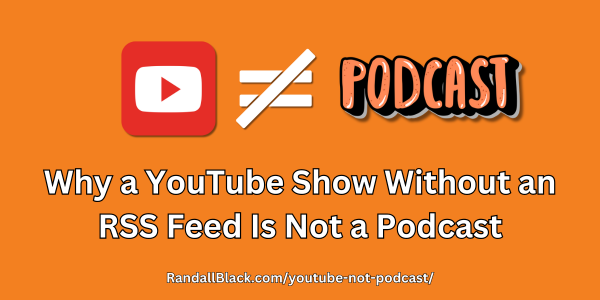Introduction
In recent years, the word “podcast” has been thrown around loosely, especially by creators on YouTube who refer to their video series as a “podcast.” However, there’s a fundamental distinction between a true podcast and a YouTube show: RSS. If a show isn’t distributed via an open RSS feed that allows listeners to access it from any podcast app of their choice, it isn’t a podcast—it’s just a video series on a proprietary platform. This distinction is crucial to maintaining the integrity and independence of podcasting as an open medium.
What Defines a Podcast?
A podcast is more than just a series of audio or video recordings—it is defined by its method of distribution. A true podcast is syndicated through an RSS feed, which enables listeners to subscribe and receive new episodes automatically in their preferred podcast app. This means a podcast can be accessed on platforms like Apple Podcasts, Spotify, Pocket Casts, and numerous other independent podcast players.
RSS (Really Simple Syndication) ensures that podcasting remains platform-agnostic, allowing creators to distribute their content freely without being locked into a single service or company’s ecosystem. The moment a show lacks an RSS feed, it ceases to be a podcast in the traditional sense.
YouTube Shows vs. Podcasts
While YouTube allows creators to publish episodic content, it does not provide an open distribution system like RSS. A show that is only available on YouTube is inherently centralized, meaning it exists solely within the YouTube ecosystem and is subject to YouTube’s policies, algorithms, and restrictions.
If YouTube decides to remove a video or suspend an account, that content disappears. Conversely, a true podcast hosted on an independent platform with an RSS feed remains accessible as long as the creator maintains their feed and hosting service.
The Importance of Ownership & Control
Podcasting, at its core, is about creator ownership. When a podcast is distributed via RSS, the creator has complete control over their content, where it is available, and how it is monetized. They aren’t dependent on a single company’s algorithms or policies to reach their audience.
YouTube creators, on the other hand, are subject to Google’s terms of service, demonetization policies, and content moderation rules. A video can be taken down or demonetized at any time, often with little recourse for the creator. In contrast, podcasts remain available across multiple apps and platforms, ensuring long-term accessibility and independence.
The Open Nature of Podcasting
One of the core values of podcasting is its openness. Unlike YouTube, which requires users to be online and often forces ads or premium subscriptions for background play, podcasts offer listeners the freedom to download episodes and listen offline at their convenience.
Furthermore, open podcasting allows for greater diversity in podcast apps and listening experiences. Listeners aren’t restricted to a single platform and can choose from a range of podcast players that suit their preferences. This fosters a more competitive, innovative ecosystem, as opposed to the walled garden approach of YouTube.
Why This Distinction Matters
Referring to a YouTube-exclusive show as a “podcast” dilutes the meaning of the term and misleads audiences into thinking podcasting requires a centralized platform. If this trend continues, it could further encourage podcasting’s shift toward closed ecosystems, undermining the open nature that has made it so successful.
By understanding the difference, creators and listeners can help preserve the independence and accessibility of podcasting. If YouTube creators truly want to call their show a podcast, they should provide an RSS feed so their audience can access the content from any podcast app—not just YouTube.
Conclusion
At its core, podcasting is about open distribution and listener choice. If a show is locked within a single platform like YouTube, it lacks the defining characteristic of a podcast: RSS syndication.
If you’re a YouTube creator calling your show a podcast, consider making it truly accessible by offering an RSS feed. And if you’re a listener, support open podcasting by using podcast apps that respect independence and choice.
Podcasting thrives on openness and accessibility—let’s keep it that way.
